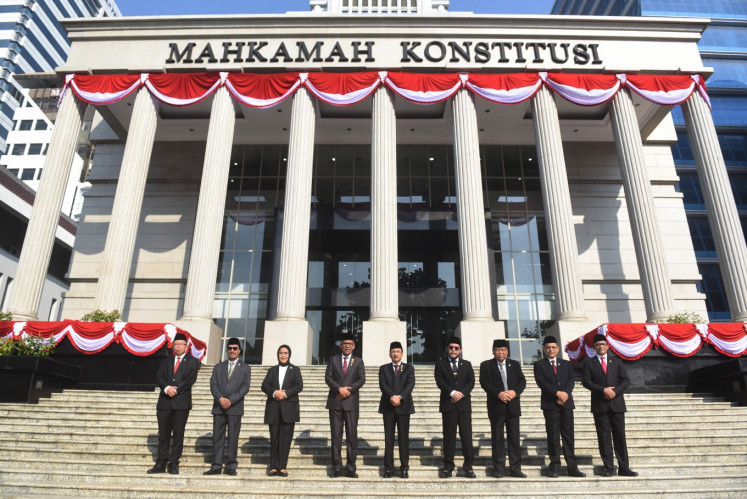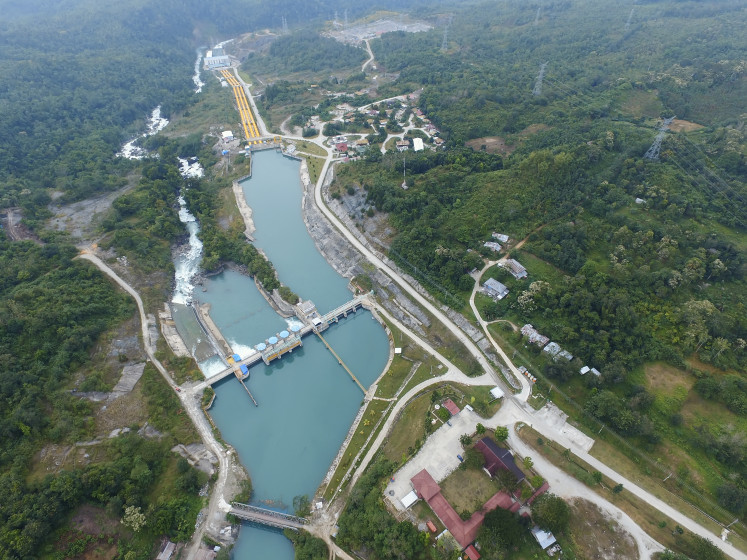Popular Reads
Top Results
Can't find what you're looking for?
View all search resultsPopular Reads
Top Results
Can't find what you're looking for?
View all search resultsInsight: Jusuf Kalla and the UN General Assembly 2015
As President Joko âJokowiâ Widodo had plans to make an official visit to the US in October, he asked Vice-President Jusuf Kalla to replace him at the 2015 series of United Nations General Assembly meetings, starting on Sept
Change text size
Gift Premium Articles
to Anyone

A
s President Joko 'Jokowi' Widodo had plans to make an official visit to the US in October, he asked Vice-President Jusuf Kalla to replace him at the 2015 series of United Nations General Assembly meetings, starting on Sept. 23. This was Kalla's first visit to the UN and he asked me to come along to discuss the various issues that would be taken up in those meetings.
It was indeed a great honor for me, as this was only my second opportunity to be part of a head of state entourage at an international event.
Fifty years ago I was in the Indonesian delegation headed by president Sukarno to attend the second Afro Asia Conference in Algiers. We were half way to Algiers when we heard the news that president Ben Bella had been ousted from power by his military commander, Houari Boumedienne, in a coup d'état. President Sukarno decided to stop in Cairo to confer with Nasser, Zhou Enlai of China, and Ayub Khan from Pakistan about the next step they should take.
The delegation then went to Paris for one week where president Sukarno called a meeting of the Indonesian Ambassadors serving in European countries to explain to them about the struggle of the New Emerging Forces (Nefos) against the Old Established Forces (Oldefos). I was there in my capacity as the secretary of the Supreme Advisory Council (DPA) accompanying its vice chair, Prof. Soejono Hadinoto.
I was privileged to be in Vice President Kalla's delegation as it gave me exposure to the global issues and multilateral cooperation at close range. I myself have been more of a regionalist, actively participating in various regional processes in the Asia Pacific region such as the Association of South East Asian Nations (ASEAN), Pacific Economic Cooperation Council (PECC), Asia Pacific Economic Cooperation (APEC), ASEAN Regional Forum (ARF), Council for Security Cooperation in the Asia Pacific (CSCAP) and the East Asia Summit (EAS).
I believe that regional institutions can perform more effectively in a relatively faster way and thus get more things done than global bodies. However, after following the events at the UN General Assembly (UNGA) for a week, I am now convinced that activities and efforts at the global level are just as important. Regional institutions relate to normative matters, while ideals and principles should be globally subscribed to and observed for development and peace internationally.
There are problems we are facing that only international cooperation can solve, such as environmental issues and international terrorism. The arrangements of the Trans-Pacific Partnership (TPP) can be divisive, because all trade issues should ideally be solved multilaterally through the World Trade Organization (WTO), but more than ever trade has become very politicized. The TPP is basically dividing the East Asia and Pacific region, especially ASEAN, and it is becoming clearer that the basis for its setup are strategic considerations.
Indonesia's role has been recognized at the UN level, and Vice President Kalla spoke at several high-profile sessions during the event. He attended sessions on the Sustainable Development Goals (SDG), Millennium Development Goals (MDG) and South-South Cooperation as initiated by Chinese President Xi Jinping, as well as sessions relating to the need to upgrade and expand peacekeeping and peace building as initiated by US President Barack Obama and another initiative of China's relating to the equality of women and their roles in all walks of life.
Additionally, the Vice President had bilateral meetings with several foreign leaders, both from developed and developing countries. This level of involvement is a clear sign that Indonesia has gained wide recognition at the global level. In part, this is due to the continuing progress of Indonesia's domestic development and its example that democracy and Islam are compatible.
Through ASEAN, Indonesia has also played a major role in regionalism in East Asia against a backdrop where there are gaps, contradictions and differences in the political-security field; and in many instances when the Security Council was not functioning, the coalition of the willing has taken over.
However, while some of the United Nations functional cooperation frameworks are useful and positive for their contribution to humankind, many have been overly politicized and become less-effective.
I must admit, Vice President Kalla did well. Not only were the preparations for the event undertaken by his staff and the Foreign Ministry excellent, through thorough reading and contact with many sources he was very informed and up to date.
Pak Kalla believes that in these kinds of global circumstances, it is not only the rich and powerful nations that can have an impact and influence, but also others who dare to be outspoken on relevant issues. Pak Kalla, thank you for having me. I have indeed learned a lot.
_______________________________________
The writer is vice chair, board of trustees, CSIS Foundation.









